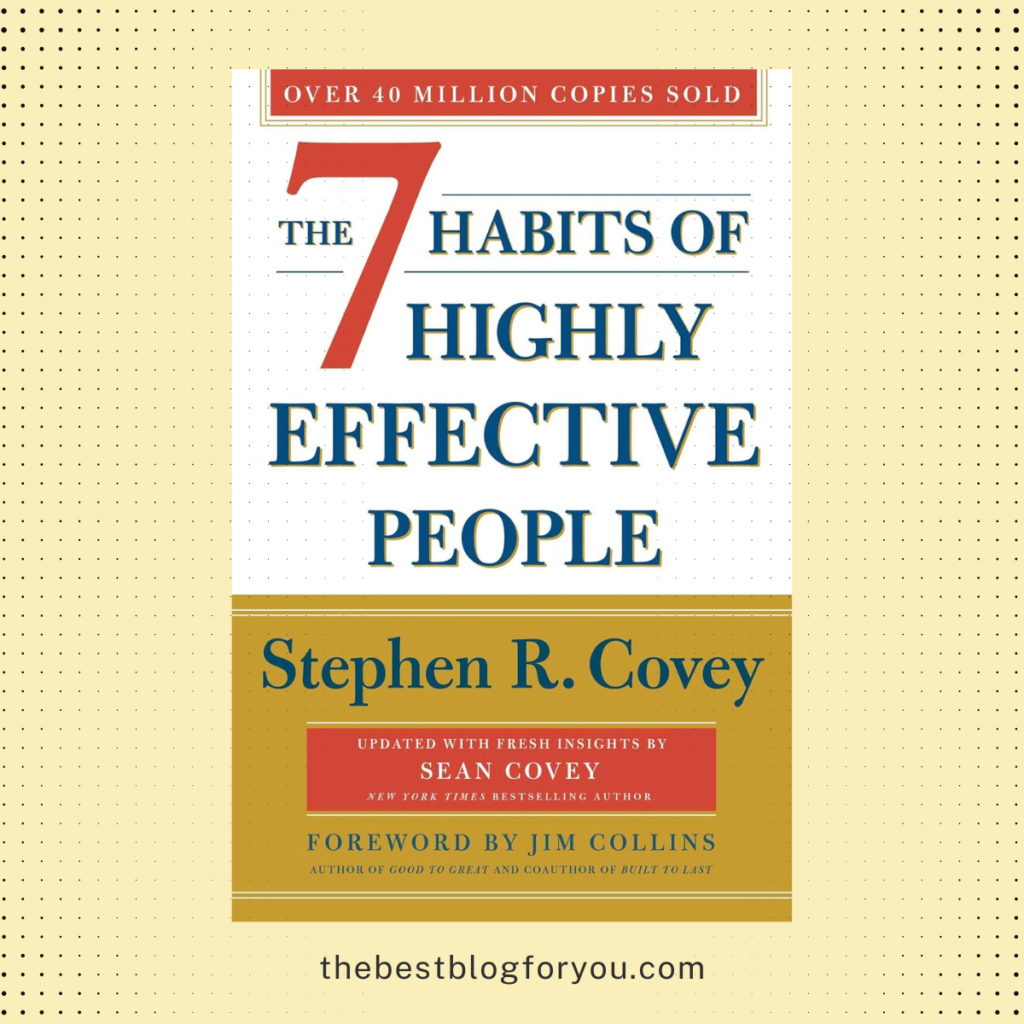
1. On Proactivity:
“Be proactive. Take responsibility for your life.”
Being proactive means taking control of your actions and decisions rather than being reactive to circumstances. It emphasizes the power of choice and personal responsibility in shaping your life.
“The way we see the problem is the problem.”
This quote highlights that our perception of a problem influences how we deal with it. By changing our perspective, we can alter the way we address challenges and find more effective solutions.
2. On Beginning with the End in Mind:
“Start with the end in mind.”
Begin any project or goal with a clear vision of the desired outcome. This habit helps in setting purposeful goals and aligning actions with long-term objectives.
“Management is efficiency in climbing the ladder of success; leadership determines whether the ladder is leaning against the right wall.”
Effective management focuses on efficiency, while true leadership ensures that efforts are directed toward the right goals. It’s essential to evaluate whether your goals align with your values and vision.
3. On Putting First Things First:
“The key is not to prioritize what’s on your schedule, but to schedule your priorities.”
This quote emphasizes the importance of focusing on what truly matters rather than merely reacting to what’s urgent. Prioritizing and scheduling important tasks ensures that you’re working towards meaningful goals.
“Things which matter most must never be at the mercy of things which matter least.”
Ensure that your focus remains on the most important aspects of your life rather than getting distracted by less significant tasks. This helps in maintaining balance and achieving what truly matters.
4. On Thinking Win-Win:
“Think win-win. Seek mutual benefit in all interactions.”
Adopting a win-win mindset means striving for solutions that benefit all parties involved. This approach fosters collaboration and positive relationships, leading to more successful outcomes.
“Win-win is a frame of mind and heart that constantly seeks mutual benefit in all human interactions.”
It’s not just about achieving your own goals but also about considering the interests of others. This mindset helps in building trust and creating sustainable agreements.
5. On Seeking First to Understand, Then to Be Understood:
“Seek first to understand, then to be understood.”
Effective communication begins with listening and understanding others before expressing your own viewpoints. This habit promotes empathy and improves relationships by addressing others’ concerns first.
“Most people do not listen with the intent to understand; they listen with the intent to reply.”
Many individuals focus on preparing their response rather than truly understanding the other person’s perspective. Active listening is crucial for meaningful communication and resolving conflicts.
6. On Synergizing:
“Synergy is better than my way or your way. It’s our way.”
Synergy involves combining strengths and perspectives to create better solutions than what could be achieved individually. It emphasizes the value of collaboration and collective problem-solving.
“The whole is greater than the sum of its parts.”
When people work together effectively, the combined result is greater than the individual contributions. This principle underscores the power of teamwork and cooperation.
7. On Sharpening the Saw:
“Sharpen the saw. Take time to renew and improve yourself.”
Self-renewal and continuous improvement are essential for personal effectiveness. This habit encourages regular self-care and growth in physical, mental, emotional, and spiritual areas.
“To maintain and increase our effectiveness, we must renew ourselves in body, mind, and spirit.”
Regular renewal and self-care ensure sustained effectiveness and well-being. By nurturing all aspects of ourselves, we can maintain high levels of performance and satisfaction.
8. On Habit Formation:
“Habits are the intersection of knowledge (what to do), skill (how to do), and desire (want to do).”
Effective habits are developed when you have the knowledge, skill, and motivation to perform them. Understanding this intersection helps in cultivating and maintaining good habits.
“The habits we form from childhood and the experiences we have are the building blocks of who we are and who we will become.”
Our habits and experiences shape our character and future. Building positive habits early in life creates a strong foundation for personal and professional growth.
9. On Personal Growth and Self-Leadership:
“Self-leadership is the ability to direct oneself and act according to principles rather than moods or emotions.”
Self-leadership involves guiding yourself based on values and principles rather than being swayed by fleeting emotions. It requires discipline and self-awareness.
“To change ourselves effectively, we first had to change our perceptions.”
Changing our behavior starts with altering our perceptions and beliefs. By shifting how we view ourselves and our circumstances, we can initiate meaningful change.
10. On Time Management and Productivity:
“Time management is really a misnomer; the challenge is to manage ourselves.”
Effective time management is about managing your actions and decisions rather than controlling time itself. Personal discipline and prioritization are key to productivity.
“The most important thing in life is not what you accomplish but how you do it.”
The manner in which you pursue and achieve your goals is as significant as the goals themselves. Integrity, values, and the impact on others are crucial aspects of success.
11. On Building Trust and Relationships:
“Trust is the highest form of human motivation. It brings out the very best in people.”
Trust is fundamental in relationships and teamwork. When trust is present, individuals are more motivated and engaged, leading to better outcomes.
“Effective relationships require a balance of courage and consideration.”
Building strong relationships involves having the courage to address issues and the consideration to understand and respect others’ perspectives.
12. On Leadership and Influence:
“Leadership is not about being in charge. It is about taking care of those in your charge.”
True leadership focuses on serving and supporting others rather than exerting control. By caring for your team and helping them succeed, you demonstrate effective leadership.
“The greatest asset of any organization is its people.”
People are the most valuable resource in any organization. Investing in their development and well-being yields the greatest returns for both individuals and the organization.
13. On Personal Mission and Vision:
“The most effective way to manage change is to create it.”
Instead of merely reacting to change, take an active role in initiating and guiding it. Being proactive in shaping change ensures that it aligns with your vision and values.
“A personal mission statement is a clear and concise expression of your values and vision for your life.”
A personal mission statement serves as a guide for your actions and decisions. It helps align your daily activities with your long-term goals and values.
14. On Creating Balance:
“Balance is the key to effectiveness. True effectiveness requires balancing your roles and responsibilities with your personal needs and values.”
Maintaining balance in various areas of life—such as work, family, and personal interests—is essential for overall effectiveness and well-being.
“True success is a balance of the personal and professional.”
Success is not just about achieving professional goals but also about fulfilling personal values and relationships. A balanced approach leads to a more satisfying and complete life.
15. On Continuous Improvement:
“There is no end to the journey of personal growth and self-improvement.”
Personal development is an ongoing process. Continuously seeking to improve and grow ensures that you remain effective and fulfilled.
“The only way to make a significant change is to take a step back and reevaluate your approach.”
Sometimes, making meaningful progress requires pausing to assess and adjust your strategies. This reflective approach helps in making more effective changes.
16. On Influence and Impact:
“You have to decide what your own role is in the world and what impact you want to make.”
Understanding your role and desired impact helps in guiding your actions and decisions. It’s about making a deliberate choice on how you want to contribute to the world.
“Effective people are not problem-minded; they are opportunity-minded.”
Instead of focusing on problems, effective people look for opportunities and solutions. This positive mindset fosters creativity and proactive problem-solving.
Check out: Key Insights from The 7 Habits of Highly Effective People by Stephen R. Covey
